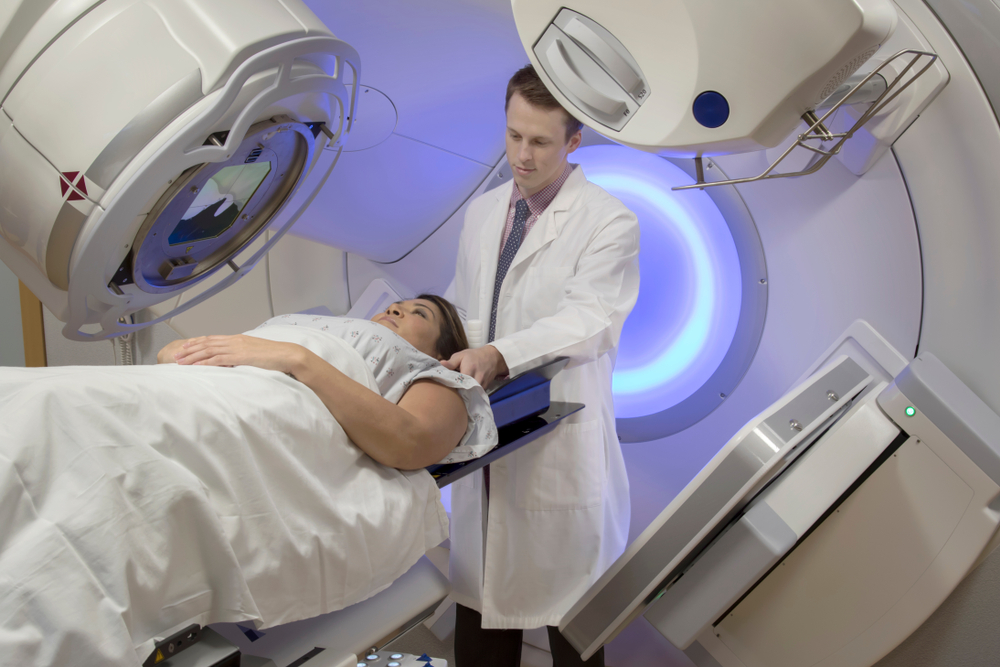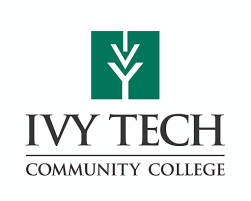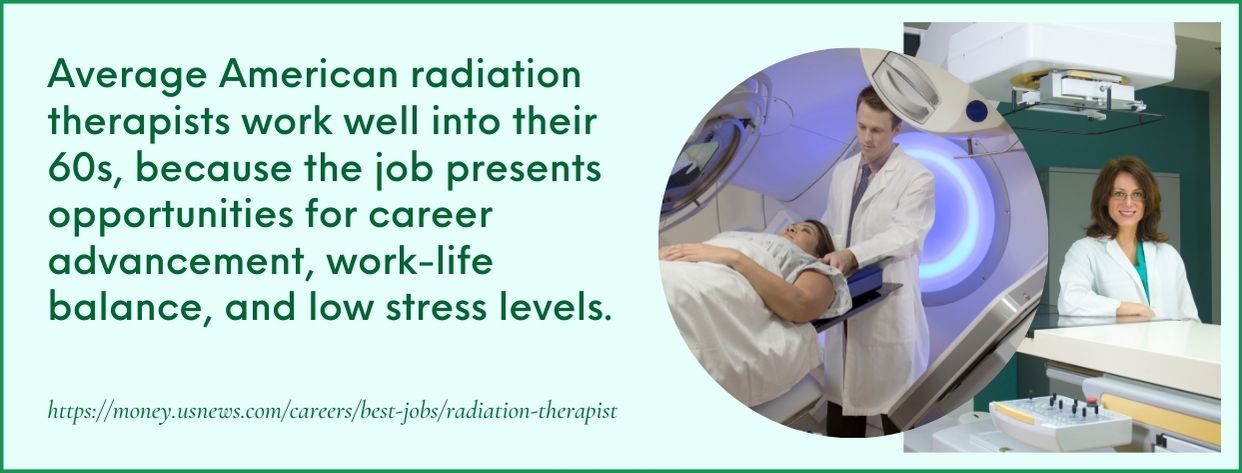Find Your Perfect School
A Radiation Therapist administers treatment to cancer patients. Most people, if not all, have friends or family that have been affected by cancer.
According to the National Cancer Institute, over 1,806,590 lives were diagnosed in 2020, with over 606,520 dying from the horrible disease in the U.S. By 2040, they estimate 29.5 million new cases with 16.4 million deaths.
Cancer remains the most prominent cause of death for many across the world. The good news is that breakthrough treatments offering radiation and chemotherapy can save many lives through modern technology. If you decide to become a Radiation Therapist, you will be a part of something big… saving lives!
Radiation therapists are healthcare professionals who use radiation to treat cancer and other diseases. Radiation therapy is a highly specialized field in which radiation is used to target cancerous cells and destroy them while sparing healthy cells.
To become a radiation therapist, individuals must complete an accredited advanced educational program, pass a certification exam, and obtain a state license. Radiation therapists must possess excellent communication and technical skills, as they will need to interact with patients, evaluate their needs, and be able to accurately operate complex radiation therapy machines.
Radiation therapists must also be prepared to administer doses with the highest possible precision and know how to handle emergencies. With dedication to the profession and continuing education, radiation therapists can enjoy rewarding and meaningful careers in the medical field.
Quick Summarization:
As cancer is on the rise, qualified radiation therapists are needed to fill the positions as they are increasingly needed, as well as to replace retirees. As a very lucrative career choice, radiation therapists provide an essential service to cancer patients. Radiation therapy programs are a great way to begin your career as a radiation therapist.
BEST SCHOOLS FOR A RADIATION THERAPIST DEGREE
Florida State College at Jacksonville
(On-campus) AS in Radiation Therapy
Students in the AS in Radiation Therapy program prepare not just for passing the ARRT National Registry certification exam but also for a successful career.
Theirs is a career filled with a positive impact on patients undergoing cancer treatment and well-paying jobs in various settings.
The 77-credit program has a comprehensive list of radiation therapy-focused courses that ensure students develop technical skills.
Courses in medical terminology, patient care, radiation biology and safety, radiation and radiographic physics, and oncology establish trade-specific skills. Courses in information technology and microcomputer applications for business widen the students’ horizons.
Transferable skills, such as communication and critical thinking skills, are a must in healthcare settings, too, and these are developed through general education courses. Students must earn satisfactory grades in humanities, social and behavioral sciences, and English composition to advance in major courses.
The reduction, if not the eradication, of pathology in healthcare settings is also an integral part of the curriculum. Students must practice safe and effective pathology habits early on.
FSCJ only accepts new cohorts on even-numbered years and during the fall term. The admission requirements consist of a high school diploma or equivalent and official college transcripts, if applicable.
Programs Offered:
- Criminal Justice
- Education
Do you want to be a successful radiation therapist? Start achieving your dream by enrolling in FSCJ’s AS in Radiation Therapy program now!
Community College of Allegheny County
(On-campus) Certificate in Radiation Technology
CCAC’s Certificate in Radiation Technology program has a selective admissions process that ensures only the best students are accepted. The number of students admitted depends on factors like the availability of clinical sites.
Candidates must possess the following minimum credentials to be considered:
- With an associate degree from a JRCERT-accredited school in diagnostic radiography; and
- With an ARRT certification in diagnostic radiography TR(R) with an 80% or better score or with said certification and current employment for at least one year
When accepted, students must complete the academic requirements for 36 credits. Radiation Physics and Protection, Radiation Oncology, and Radiation Therapy Technology are among the course titles. Students are required to earn satisfactory grades to stay in the program and earn the certificate.
Students obtain a wide range of clinical skills relevant to radiation therapy, including safety-related equipment operations and effective patient interactions.
Critical thinking and communication skills are necessary for the profession, so these are also encouraged in the program.
Graduates are eligible to take the ARRT Radiation Therapy certification exam. CCAC has a good track record in it, thanks to the intensive training for its students.
Programs Offered:
- Paralegal
- Multimedia and Gaming
Earn the promotion you’ve been hoping for with a certificate in radiation therapy from CACC! See if it fits your career plans.
Ivy Tech Community College
(On-campus) AAS in Healthcare Specialist with a concentration in Radiation Therapy
This is a six-semester program where students must comply with courses’ academic and clinical requirements in the 70-credit curriculum.
Ivy Tech has a selective admission policy with students admitted into the Healthcare Support program first while completing the prerequisite courses. Afterward, students make a separate application into the Radiation Therapy concentration program.
Only a limited number of learners are accepted for the annual cohort. Candidates must also pass the rigorous TEAS exam before being considered.
Once accepted, students must undergo a physical exam, drug testing, and a criminal background check at their own expense. These are compulsory requirements considering the nature of the work of radiation therapists.
Students are provided with completion guides detailed in eight-week terms. Academic advisors are ready to guide the best courses to take every semester.
Ivy Tech’s challenging academic coursework includes radiation physics, pathology and treatment principles, and radiation biology and safety. Patient care and professional ethics are also emphasized since radiation therapists must work with patients and other healthcare professionals.
Clinical experience includes hands-on learning about various machinery like Virtual Linear Accelerator (VERT). Radiation therapist students also get experiential learning opportunities for patient treatment planning via their clinical rotations.
Programs Offered:
- Design Technology
- Entrepreneurship
Earn the Ivy Tech AAS in Healthcare Specialist with a concentration in Radiation Therapy degree and watch your career shoot up soon! Earn your associate’s degree today!
Cambridge College of Healthcare and Technology
(Hybrid) AS in Radiation Therapy
The two-year AS in Radiation Therapy program has a hybrid format with classroom settings and an online platform. On the other hand, students can then enjoy a good balance between personal and professional obligations and academic responsibilities.
Students prepare for a career as professional radiation therapists in hospitals and cancer treatment facilities. This is also offered on multiple campuses, including Orlando, Florida, and Atlanta, Georgia.
Graduates can take the ARRT National Registry certification exam, with Cambridge College being known for its high passing rate. The associate degree and certification are acceptable credentials for entry-level work in radiation therapy.
The curriculum emphasizes the theoretical knowledge and practical skills that students will need during their professional lives.
The coursework includes health science, anatomy and physiology, radiation therapy physics, and treatment planning. Patient care being an integral part of the work, students also develop their communication skills and compassion for patients.
Students have easy access to the campuses’ facilities, including libraries and covered parking. Every campus also has job placement services where students can establish job networks early. Students also complete clinical rotations in local healthcare facilities with their experiences, including equipment operation.
Programs Offered:
- Computer Networking
- Health Information Management
Are you ready to become a radiation therapist? But, need an associate’s degree? Cambridge Health’s AS in Radiation Therapy degree program is among the best, and it’s the reason why you should consider earning it!
University of Texas MD Anderson Cancer Center
(Hybrid) BS in Radiation Therapy
Facilitated by the School of Health Professions, the BS in Radiation Therapy program has rigorous coursework that requires compulsory attendance in all scheduled activities. Students, particularly working students, must make appropriate arrangements since the program cannot make accommodations otherwise.
Students undergo six semesters of full-time coursework; summer semesters also require a full-time commitment. Student support services are available for struggling students, including by-request tutoring and academic and career advising.
Faculty members are known to take a professional interest in their student’s success, too. Students must read the Student Handbook for more information about the policies and procedures in the program.
Attendance in all academic and clinical courses is a must. Students must attend three days of classes and two days in a clinical setting every week during the first year. Then in the second year, it’s three days in the clinic and two days in the classroom.
Classes may also be conducted online with advance notifications. The clinical sites can be as far as 50 miles from the campus, so reliable transportation is recommended.
There’s a prescribed course sequence that students must follow. A minimum “C” grade in all subjects and courses is required for a student to advance to the next semester.
Programs Offered:
- Medical Dosimetry
- Diagnostic Imaging
Calling all Radiation Therapists… MD Anderson’s BS in Radiation Therapy degree program is nationally recognized for its excellent instruction and, thus, it may well be your best choice!
Galveston College
(On-campus) AAS in Radiation Therapy
GC’s AAS in Radiation Therapy program is in its 43rd year – the oldest of its kind in the State of Texas – and it continues to be the best!
Students agree that it provides the best value education considering its affordable cost – about $5,000 including fees and books for its entirety – and quality instruction.
Radiation therapist students can earn the degree in 21 months if the prescribed sequence of courses is followed. The five semesters in the program are divided into academic studies and hands-on clinical work. The curriculum itself follows JRCERT and ASRT standards, meaning graduates can sit for the certification exam.
Retention means earning at least 80% in all courses. The courses include anatomy and physiology, medical terminology, radiation biology and safety, and patient care. These are ever-evolving courses, too, since GC integrates new technologies and treatment procedures into its curriculum.
Students get hands-on training through unpaid clinical rotations. Their primary responsibility is to assist registered radiation therapists in tomotherapy, brachytherapy, and cyberknife procedures, among other forms of radiation therapy.
Graduates have professional-level clinical competencies due to their academic and clinical training as radiation therapists.
Programs Offered:
- Nursing
- Healthcare Management
Get more information about GC’s AAS in Radiation Therapy degree now! You’ll find this associate’s degree may very well be a great fit for your personal needs and career goals.
Saint Louis University
(On-campus) BS in Radiation Therapy
SLU’s BS in Radiation Therapy is among the highest-ranked countries for its excellent curriculum that combines rigorous coursework and hands-on training.
The science-based curriculum has an interdisciplinary focus where collaborations across healthcare disciplines are emphasized, and it’s the same approach in healthcare settings.
Radiation therapist students gain real-world skills with the guidance of experienced faculty members with above-par professional credentials. SLU maintains small classes so that students can get more mentorship from the faculty, too.
Undergraduates aren’t limited in their personal growth to their academics, as rigorous and useful as the courses may be. SLU provides numerous research opportunities for undergraduates, and the research papers can be presented and published.
Students must also undergo 1,200 hours of clinical internship at several local healthcare facilities. These settings range from community hospitals to state-of-the-art research facilities where radiation therapy treatments are studied and administered.
The diversity of settings encourages radiation therapist students to adapt to changing structures, protocols, and people effectively.
SLU offers two curriculum tracks – a pre-physician assistant and a pre-med track. All graduates, however, are eligible to sit for the ARRT national certification exam.
The admission criteria result in selective acceptance. Candidates must demonstrate solid academic performance as evidenced by their GPA and standardized test scores.
Programs Offered:
- Aerospace Engineering
- American Studies
Do you want to up your game as a Radiation Therapist? Progress faster in your career by earning a Bachelor’s degree! Check out SLU’s BS in Radiation Therapy degree!
Texas State University
(On-campus) BS in Radiation Therapy
TSU grants the BS in Radiation Therapy degree to students who have completed at least semester credit hours. This is a JRCERT-accredited program with a professional curriculum designed following ASRT standards.
Students are accepted into the program during their freshman and sophomore years which are spent on general education courses during their junior year. The average completion time inclusive of the academic coursework and clinical practicum is 2½ years.
The academic component consists of major courses designed as a preparation for the demanding work in radiation therapy. Students acquire technical skills, including planning, administering, and recording prescribed radiation therapy plans.
These skills are developed through trade-specific courses like radiation physics, radiation oncology, radiologic science, and medical imaging.
The clinical practicum is conducted in affiliated local healthcare facilities like hospitals and cancer clinics. The experiences here are built on prior courses like clinical simulation laboratory and directed clinical learning.
As a result of the intensive training, graduates are well-prepared for the job’s demands, including its technical, physical, and psychological aspects.
Graduates can then become qualified to sit for the national certification exam and, once registered, for entry-level jobs. Since their academic credential is a bachelor’s degree, career advancement may happen sooner.
Programs Offered:
- Applied Sociology
- Engineering Technology
Getting ahead in your career as a radiation therapist can start with a BS in Radiation Therapy from TSU! See where this Bachelor’s degree will take you.
The Ohio State University
(Online) AS to BS Completion Degree in Radiologic Sciences and Therapy
Do you already have a certification in radiation therapy, radiography, sonography, or nuclear medicine technology but do you want to advance your career? Then you must consider OSU’s AS to BS Completion Degree in Radiologic Sciences and Therapy!
Since career advancement is in your sights, your training will focus more on the management side. The coursework includes classes on management principles and practices in human resources and quality management in healthcare settings.
Graduates are eligible to sit – and have higher chances of passing, too – for the Certified Radiology Administrator’s (CRA) certification exam. The credential is valuable in being hired for management positions in the field of radiation therapy since it’s proof of your professional competency.
With an associate degree, the degree completion program can be completed in two years or less. Radiation Therapist students gain technical skills through academic coursework and clinical experiences, including a capstone project.
The project usually involves the implementation of effective and efficient quality improvement strategies in your current workplace.
There are three tracks to choose from – radiation therapy, sonography, and radiography. Students in all tracks receive individualized attention, thanks to small class sizes of between 10 and 20 students, from experienced faculty. Clinical fieldwork for all tracks occurs in many of Ohio’s prestigious facilities.
Programs Offered:
- Respiratory Therapy
- Athletic Training
Do you need a Bachelor’s degree to advance your career as a Radiation Therapist? Earn the BS in Radiologic Sciences and Therapy degree from the prestigious OSU!
Washburn University
(Hybrid) Certificate in Radiation Therapy
This is a professional certificate program, so candidates must possess an associate degree, minimum, before being considered for admission. Students earn the certificate in 13 months and become eligible for the American Registry of Radiologic Technologists (ARRT) certification.
These radiation therapy programs use a hybrid method with online classes and in-person clinical experiences, meaning working professionals are welcome.
The classes are synchronized so aspiring radiation therapists and faculty can learn and interact in real time. Weekly virtual meetings with compulsory attendance are also part of student life.
The clinical is conducted in an affiliated radiation therapy center where students get hands-on experience in patient interactions and equipment operations. These are unpaid internships that can last from Monday through Friday, and students must plan accordingly.
There are 40 credits in the program, and the coursework has a heavy emphasis on radiation therapy. Therapeutic Radiobiology, Radiation Therapy Physics, Oncology, Simulation & Treatment Procedures are among the course titles.
Online radiation therapist students enjoy a wide range of student support services that their on-campus counterparts also enjoy. These are intended to promote academic success among students, including information technology services, online education support, and a writing center.
Programs Offered:
- Chemistry
- Legal Studies
Jumpstart your career as a radiation therapist with a certificate from Washburn University! Earning it in just 13 months is icing on the cake.
FREQUENTLY ASKED QUESTIONS
What exactly does a Radiation Therapist do?
In general, Radiation Therapists are tasked with administering radiation treatments to patients with cancer and other diseases. In addition, they must determine the exact location of the cancer and then explain treatment plans.
Patients must also be protected from unnecessary exposure, along with the Radiation Therapists. You will also be tasked with operating radiation therapy equipment that administers the radiation to shrink or remove cancerous tumors. Radiation therapy procedures must be direct and exact.
You will also keep an eye on your patient’s reactions and update detailed records of patient data. Radiation Therapists are also tasked with monitoring patient comfort.
The certified Radiation Therapist will often manage radiation therapy programs and teach others about the occupation.
How much money does a Radiation Therapist earn?
The BLS states that as of May 2022, Radiation therapists earned $89,530 annually, with the highest 10% earning upwards of $133,260 or more per year. Many licensed Radiation Therapists manage radiation therapy programs and teach others about the occupation.
What’s the job growth outlook for Radiation Therapists?
The expected job growth rate for radiation therapy is positive at 2% between 2022 and 2032. As people age and the diagnosis of cancer prevails in many, the need for Radiation Therapists will increase.
What kind of work schedule can I expect as a Radiation Therapist?
Since most radiation treatments are planned ahead of time through appointments, most Radiation Therapists work a regular 40-hour week, Monday through Friday.
How do I become a Radiation Therapist?
Generally speaking, becoming a registered Radiation Therapist will require some specific training, such as earning an Associate degree in the field to begin your career. Although most employers prefer an Associate’s (or even a Bachelor’s) degree, some entry-level jobs only require a certificate program.
What will I learn in a Radiation Therapist degree program?
Radiation therapy programs will learn about radiation therapy practices, as well as:
- Scientific Theories & Research Methodology
- Human Anatomy
- Physics
- Algebra
- Computer Science
- Physiology
- And, much more!
Should my Radiation Therapist program be accredited?
Yes, locating an accredited Radiation Therapy program is important. An educational program for a registered radiation therapist should be recognized by the American Registry of Radiologic Technologists (ARRT).
How long does it take to become a Radiation Therapist?
For radiation therapists, if you earn an Associate degree in the field, it will take you two years on average.
What skills do I need to be a Radiation Therapist?
Do you want to become a radiation therapist? Have you got what it takes? Besides the obvious technical training, a radiation therapist must be detail-oriented and have excellent people skills. You should also be able to lift and move patients and stand on your feet for long periods. And… don’t forget your compassion as you care for hurting or perhaps, terminally ill patients as a radiation therapist.
Where does a Radiation Therapist work?
Certified Radiation Therapists are an intricate part of the oncology team, as they work closely with physicians, other nurses, and other types of specialists. They often work in hospitals, cancer care clinics, outpatient facilities, and doctor’s offices as they administer the patient’s radiation treatment. Cancer treatment centers are located in almost every major city.
Does a Radiation Therapist need to be licensed?
Yes, in most states, a Radiation Therapist must pass a national certification exam to gain licensure specific to radiation therapists. States require radiation therapists to be properly credentialed to work in healthcare facilities, such as cancer treatment centers.
Is working with radiation a safe job?
Of course, working in radiation comes with some occupational hazard risks; however, learning how to minimize exposure and how to be safe will be part of your training while learning to be a radiation therapist.
Can I become a Radiation Therapist online?
Online programs in this field may be hard to find unless they are certificate programs or Bachelor’s degree programs designed to help you advance in your field.
Although some programs may be considered “online,” you may need to plan on some on-campus attendance for clinical lab work. Check with your program’s specifics before signing on if you are looking for a program that is primarily presented through a distance-learning option.
What are the differences between a Radiation Therapist and a Radiologic Technologist?
As they both work in the field of radiation, they have different job descriptions. The Radiation Therapist administers radiation to cure or decrease the cancer tumor in the body. The Radiologic Technologist will perform imaging techniques to determine the location of the cancer for a proper diagnosis and treatment.
What are the advantages of becoming a Radiation Therapist?
- Good Salary: Radiation therapists often receive competitive salaries and enjoy excellent job security due to the growing demand for trained professionals in this field.
- Autonomy: Radiation therapists have considerable independence to make decisions in their work, as they are sometimes the only radiotherapy professionals operating in their ward or department.
- Patient Care: Working as a radiation therapist allows you to directly help those affected by life-threatening illnesses and diseases, as you’ll be providing vital treatments for their fight against cancer and other conditions.
- Varied Environment: Radiation therapists work in a range of healthcare environments, from the traditional hospital setting to more specialized radiation oncology centers.
- Continuous Learning: As radiation therapy technology advances, so too do the job requirements of radiation therapists. The need to stay up-to-date with new technology as well as emerging treatments offers great potential for continual learning and professional development.
For more information about the Radiation Therapist’s career, check this out:
Are you ready to take the next step to become a Radiation Therapist?
Do you need an online or hybrid Associate’s or Bachelor’s degree option?
See: The Top 10 Best Radiation Therapist Schools
Key Takeaways
Radiation Therapists are an integral part of the healthcare system in the U.S. today due to the rise of cancer-related illnesses that plague us today. If you have experienced cancer yourself or know someone who has, then you realize the importance of a well-qualified radiation therapist. Consider these points:
- Radiation therapy programs are readily available, and we’ve chosen the best of the best for your review.
- Radiation therapists can earn a lucrative living, along with many benefits such as medical, dental, and vision insurance.
- Radiation therapists must be knowledgeable in not only how to administer to patients undergoing treatments but also detailed facts about patient care after radiation treatments.
- Radiation therapists must be aware of all safety protocols to protect themselves, as well as their patients.
- Radiation therapists work closely with fellow radiation therapists, registered nurses, and radiation oncologists as they help to administer the radiation treatment.
- Aspiring radiation therapists must be state-certified or licensed according to each state’s requirements for administering radiation treatment. ARRT certification is required for Radiation Therapists to practice.
- A successful radiation therapist has a heart for helping others in need.
Radiologic technology is a growing field and an excellent career choice. To become a radiation therapist, check out our career and radiation therapist program guide! An associate degree program is a great start!
Is becoming a Radiation Therapist not your cup of tea?
Here are some other suggestions:











